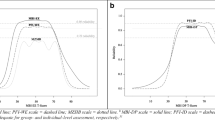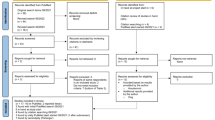ABSTRACT
BACKGROUND
Burnout is a common problem among physicians and physicians-in-training. The Maslach Burnout Inventory (MBI) is the gold standard for burnout assessment, but the length of this well-validated 22-item instrument can limit its feasibility for survey research.
OBJECTIVE
To evaluate the concurrent validity of two questions relative to the full MBI for measuring the association of burnout with published outcomes.
DESIGN, PARTICIPANTS, AND MAIN MEASURES
The single questions “I feel burned out from my work” and “I have become more callous toward people since I took this job,” representing the emotional exhaustion and depersonalization domains of burnout, respectively, were evaluated in published studies of medical students, internal medicine residents, and practicing surgeons. We compared predictive models for the association of each question, versus the full MBI, using longitudinal data on burnout and suicidality from 2006 and 2007 for 858 medical students at five United States medical schools, cross-sectional data on burnout and serious thoughts of dropping out of medical school from 2007 for 2222 medical students at seven United States medical schools, and cross-sectional data on burnout and unprofessional attitudes and behaviors from 2009 for 2566 medical students at seven United States medical schools. We also assessed results for longitudinal data on burnout and perceived major medical errors from 2003 to 2009 for 321 Mayo Clinic Rochester internal medicine residents and cross-sectional data on burnout and both perceived major medical errors and suicidality from 2008 for 7,905 respondents to a national survey of members of the American College of Surgeons.
KEY RESULTS
Point estimates of effect for models based on the single-item measures were uniformly consistent with those reported for models based on the full MBI. The single-item measures of emotional exhaustion and depersonalization exhibited strong associations with each published outcome (all p ≤0.008). No conclusion regarding the relationship between burnout and any outcome variable was altered by the use of the single-item measures rather than the full MBI.
CONCLUSIONS
Relative to the full MBI, single-item measures of emotional exhaustion and depersonalization exhibit strong and consistent associations with key outcomes in medical students, internal medicine residents, and practicing surgeons.


Similar content being viewed by others
References
Haas JS, Cook EF, Puopolo AL, Burstin HR, Cleary PD, Brennan TA. Is the professional satisfaction of general internists associated with patient satisfaction? J Gen Intern Med. 2000;15:122–8.
Shanafelt TD, Bradley KA, Wipf JE, Back AL. Burnout and self-reported patient care in an internal medicine residency program. Ann Intern Med. 2002;136:358–67.
West CP, Huschka MM, Novotny PJ, et al. Association of perceived medical errors with resident distress and empathy: a prospective longitudinal study. JAMA. 2006;296:1071–8.
Dyrbye LN, Thomas MR, Massie FS, et al. Burnout and suicidal ideation among U.S. medical students. Ann Intern Med. 2008;149:334–41.
West CP, Tan AD, Habermann TM, Sloan JA, Shanafelt TD. Association of resident fatigue and distress with perceived medical errors. JAMA. 2009;302:1294–1300.
Dyrbye LN, Thomas MR, Power DV, et al. Burnout and serious thoughts of dropping out of medical school: a multi-institutional study. Acad Med. 2010;85:94–102.
Dyrbye LN, Massie FS Jr, Eacker A, et al. Relationship between burnout and professional conduct and attitudes among US medical students. JAMA. 2010;304:1173–80.
Shanafelt TD, Balch CM, Bechamps G, et al. Burnout and medical errors among American surgeons. Ann Surg. 2010;251:995–1000.
Shanafelt TD, Balch CM, Dyrbye L, et al. Suicidal ideation among American surgeons. Arch Surg. 2011;146:54–62.
West CP, Shanafelt TD, Kolars JC. Quality of life, burnout, educational debt, and medical knowledge among internal medicine residents. JAMA. 2011;306:952–60.
Maslach C, Jackson SE, Leiter MP. Maslach Burnout Inventory Manual. 3rd ed. Palo Alto, CA: Consulting Psychologists Press; 1996.
Rafferty JP, Lemkau JP, Purdy RR, Rudisill JR. Validity of the Maslach Burnout Inventory for family practice physicians. J Clin Psychol. 1986;42:488–492.
Thomas NK. Resident burnout. JAMA. 2004;292:2880–9.
West CP, Dyrbye LN, Sloan JA, Shanafelt TD. Single item measures of emotional exhaustion and depersonalization are useful for assessing burnout in medical professionals. J Gen Intern Med. 2009;24:1318–21.
Rohland BM, Kruse GR, Rohrer JE. Validation of a single-item measure of burnout against the Maslach Burnout Inventory among physicians. Stress Health. 2004;20:75–9.
Hansen V, Girgis A. Can a single question effectively screen for burnout in Australian cancer care workers? BMC Health Serv Res. 2010;10:341.
Maslach C, Jackson SE. The measurement of experienced burnout. J Occup Behav. 1981;2:99–113.
Acknowledgments
This work was supported by the Mayo Clinic Department of Medicine Program on Physician Well-Being The authors wish to acknowledge the participation of the American College of Surgeons and the site leaders for each medical school, Steven J. Durning, MD (Uniformed Services University of the Health Sciences), Anne M. Eacker, MD (University of Washington School of Medicine), William Harper, MD (University of Chicago Pritzker School of Medicine), F. Stanford Massie, MD (University of Alabama School of Medicine), Christine Y. Moutier, MD (University of California, San Diego), David V Power, MD (University of Minnesota Medical School), and Matthew R. Thomas, MD (Mayo Clinic).
Conflict of Interest
The authors declare that they do not have a conflict of interest.
Author information
Authors and Affiliations
Corresponding author
Rights and permissions
About this article
Cite this article
West, C.P., Dyrbye, L.N., Satele, D.V. et al. Concurrent Validity of Single-Item Measures of Emotional Exhaustion and Depersonalization in Burnout Assessment. J GEN INTERN MED 27, 1445–1452 (2012). https://doi.org/10.1007/s11606-012-2015-7
Received:
Revised:
Accepted:
Published:
Issue Date:
DOI: https://doi.org/10.1007/s11606-012-2015-7




